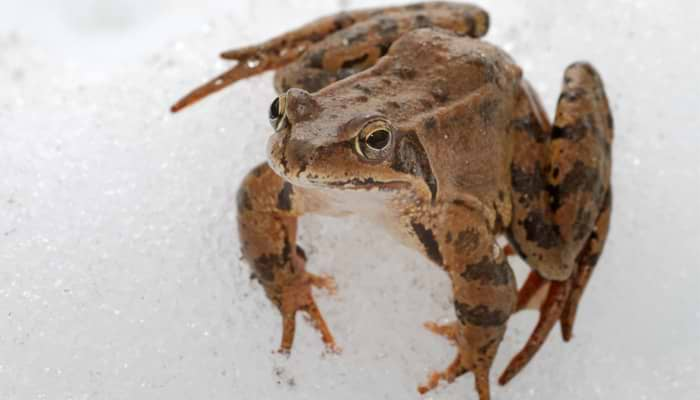
© IrenaDebevc / Shutterstock.com
Seeing the treasure trove of wildlife in your own winter garden is a treat - in fact, it's one of the bright spots of the season. Apart from the many different species of birds wintering in the UK, you're also likely to spot animals, including hedgehogs and squirrels.
If you wish to encourage more birds, mammals and pond life such as toads and frogs to spend time in your garden, there are plenty of things you can do. Preparing your garden for winter visitors is an enjoyable and healthy way to pass the time, as it's a physical activity that gets you out of the house and into the fresh air.
Birds
Many people enjoy bird-watching, taking great pleasure from seeing our feathered friends feeding and fluttering around the bird table and feeders.
The bird most associated with winter is the robin, famous for his red breast and association with Christmas. Other winter garden visitors include bullfinches, bluetits and waxwings, including those migrating to the UK from Scandinavia.
Help birds survive the winter by putting fat blocks in wire cages in feeding areas, including berry cakes for finches, insect cakes for tits and peanut cakes for starlings. Grated cheese and finely chopped bacon rind will attract small birds such as wrens. Provide nuts, seed and a grain mix to give wild birds a balanced diet.
Hedgehogs
The most popular animal who may visit your garden is the hedgehog. According to the British Hedgehog Society, there are around 1.5 million hedgehogs across England, Scotland and Wales. These small, spiky creatures hibernate in winter, so help them to prepare by leaving out plenty of food beforehand.
Squirrels
You'll be more likely to see the UK's most prevalent squirrel, the grey variety, rather than the rarer red in winter. There are an estimated 2.7 million grey squirrels in Britain, compared with only around 120,000 native red.
Squirrels are active only for a few hours a day in winter, so they need to find all the food they can to keep them going. They often hide food supplies in parks and then can't find it again, so they may need a helping hand in your garden. They eat mainly nuts, seeds and chestnuts in winter.
Amphibians and reptiles
If you have a garden pond, you will attract amphibians and reptiles including frogs, toads and newts. If you're planning on composting any garden waste, always check it carefully for these small creatures before turning it over with a garden fork. Also, never burn garden waste without checking it.
If the temperature drops below freezing, melt a hole in the ice on your pond, so amphibians and reptiles can survive and the mammals and birds can drink. The best way to do this is by filling a pan with hot water and standing it on the ice to gently melt it. Never pour boiling water on to the ice, as this could harm any creatures underneath. Similarly, don't crack the ice with a hammer or other tool for the same reason.
The pond also provides a place where tadpoles can develop. Make sure one side gradually slopes up to dry land, so they can climb out when the time comes. Encourage adult amphibians to hang around by providing log piles and damp habitats where they can shelter.
If you're working in the garden around the pond, or in damp weather, it's advisable to wear wellington boots and warm waterproof clothing. Gardening is only fun if you're warm and dry!
Insects
Insects are an important and fascinating part of your winter garden wildlife. Help them to survive by drilling holes in a block of wood or log, so they can crawl in during freezing nights. Dragonfly larvae may be found in your pond during the winter months, so clean it out with care to avoid harming them.
Spiders' eggs may survive in your flower beds, so don't turn the soil over unless absolutely necessary until spring. Don't prune healthy herbaceous plants until early spring, as they can make a perfect home for insects over winter.
Moths can also survive the winter as larvae or pupae in the soil, so avoid disturbing them too. You may also find moths sheltering over winter in your shed or greenhouse.
Benefits of wildlife
Wildlife brings beauty, movement and colour to the great outdoors.
Our winter garden visitors can struggle during the colder months if food isn't left out, so why not take the kids out and teach them a thing or two about the wonders of nature – but make sure they’re wrapped up warm!





